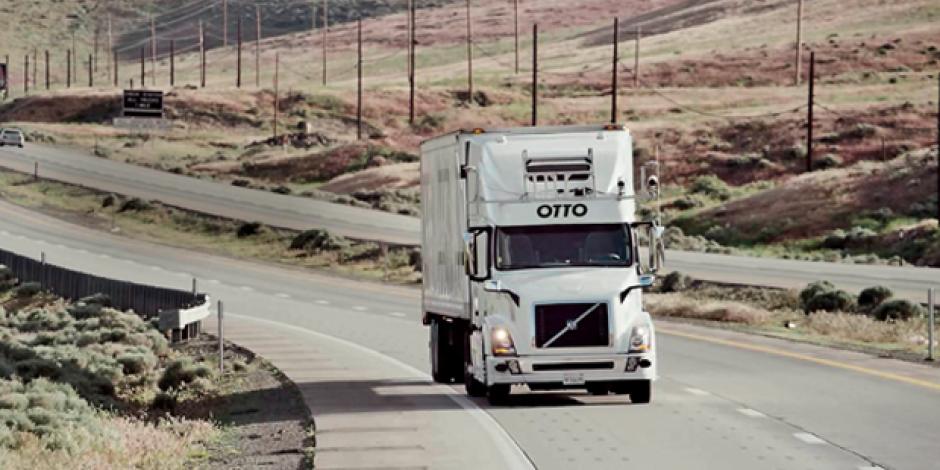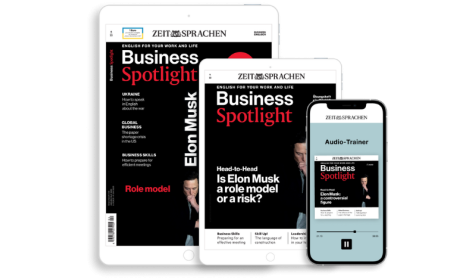Starten Sie den Audio-Text
Mit dem Audio-Player können Sie sich den Text anhören. Darunter finden Sie das Transkript.
Transcript: Interview with Eamonn Fitzgerald
Erin Perry: Eamonn, in your latest column, you talk about disruptionStörung; hier: Umbruch, Umwälzungdisruption. Perhaps you could start by telling us exactly what disruption is and why it’s so significant.
Eamonn Fitzgerald: Disruption is another word for change. But not just change, dramatic change, and change that’s often associated with technology and also fundamentally with creating new markets for new products and services. If we go back to the beginning of the last century, people were happy enough with horses as a means for transport. And then along came the automobile. And so all the people who bred and fed and cleaned up after horses lost their jobs. But lots of new jobs were created in factories for making cars, for making windows for cars and seats for cars and, in our time, entertainment systems for cars. In the 1980s, people used typewriterSchreibmaschinetypewriters in offices. Then along came the personal computer, and suddenly, you could create documents on computers, you could create presentations, and there were jobs for computer technicianTechniker(in)technicians, for network administrators. Then ten years ago, Steve Jobs presented the iPhone, and that was a shock for Nokia and Motorola, Blackberry, and lots of new jobs for creating apps and creating services for smartphones and games. So, disruption is change and it’s a change that’s important because it to affect sth.etw. betreffenaffects economies and societies.
Perry: Are there particular industries that are more to be susceptible to sth.für etw. anfällig seinsusceptible to disruption?
Fitzgerald: Any industry that can be automated will be automated. So wherever we see production line manufacturingBandproduktionproduction line manufacturing, we can expect that in the near future, if it’s not currently happening, robots will play an increasing role in making the things that are being made, whether they be cars, phones or refrigeratorKühlschrankrefrigerators. The end of this process is still not in sight. We don’t really know where we’re going here. It’s all a bit new. But if we look at what’s happening in the automotiveKfz-automotive industry, there is tremendousenormtremendous pressure at the moment to make cars self-driving, autonomous cars. And the impactAuswirkung(en)impact of that could be huge. We’re talking about a future in which taxi drivers don’t exist as we know them. Lots of jobs lost there. We’re talking about truckerLkw-Fahrer(in)truckers who want their jobs. So, this is the beginning of a dramatic change where robotics, machine- learning, artificial intelligence and algorithms are shaping the future of work. Perhaps people who are employed in creative industries or in caring industries, where human creativity, human originality and human care and touch and love is needed, their jobs won’t be affected. But I don’t think we can make too many predictionVorhersagepredictions at the moment about what won’t be changed by technology.
Perry: Finally, Eamonn. Is the election of Donald Trump an example of disruption?
Fitzgerald: I think so. Here we have the leader of a very powerful country, who is not a politician. What he is is a combination of businessman and celebrityProminente(r)celebrity. And what’s uniqueeinzigartigunique about him is how he uses social media to communicate. A completely new way of sending his message to his supporters and to the world. And this puts in question the role of the media in future, the role of politics as we know it. Maybe in other countries, people will demand that their politicians in future are entertainers, are amusing, are controversial, are outrageousunmöglich, skandalösoutrageous. So this, I think, is a classic example of disruption, total change, dramatic change.
Perry: Thank you very much, Eamonn.
Fitzgerald: you’re welcomegern geschehenYou’re welcome.
Neugierig auf mehr?
Dann nutzen Sie die Möglichkeit und stellen Sie sich Ihr optimales Abo ganz nach Ihren Wünschen zusammen.



